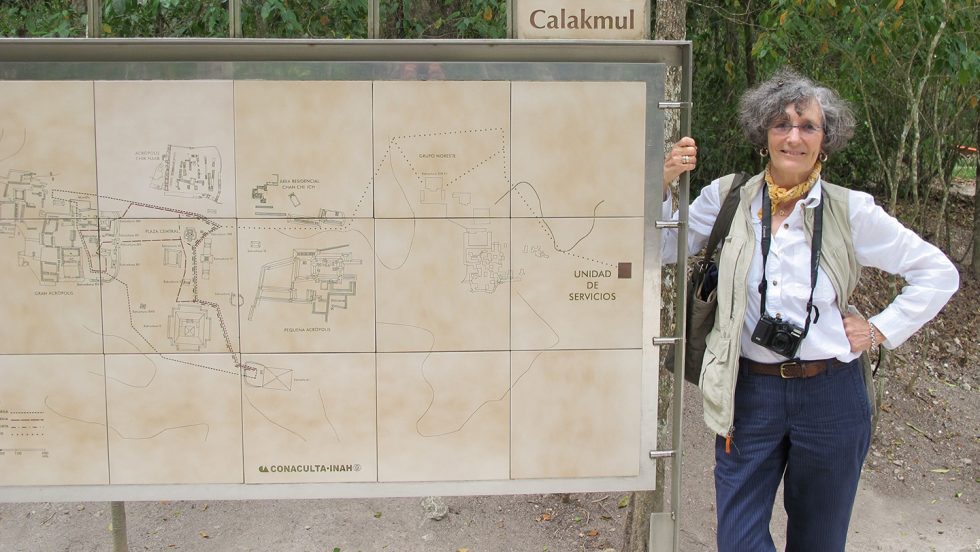
Taking Spanish at the Wantagh, New York, high school was “serendipity," said Laraine Fletcher '61, PhD, a longtime anthropology professor at Adelphi University. It was the decision of a lifetime.
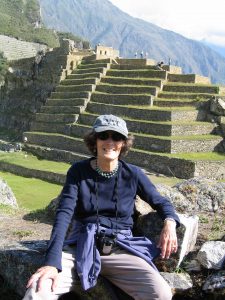
Laraine Fletcher, PhD, visiting Machu Picchu in Peru
That choice led her to Adelphi as the first in her family to go to college, where she won a scholarship and majored in Spanish. Now professor emerita, Dr. Fletcher has spent her life working all over the historic region of Mesoamerica studying the Mayans.
Located in what is today southeastern Mexico, Guatemala, Belize and the western parts of Honduras and El Salvador, the Mayan civilization is known for its art, architecture, mathematics, calendar and astronomical system. It had the most sophisticated writing system in the pre-Columbian Americas, with books written on paper and libraries—until those libraries were almost entirely burned by the Spanish.
“Laraine’s areas of expertise in the cultures and archaeology of the Maya languages, peoples and architecture are truly worth celebrating,” said Hanna Kim, PhD, associate professor and chair of the Department of Anthropology. “Through her multimillion dollar grants with the National Endowment for the Humanities and the hundreds of academics and others who have been selected for her NEH seminars, the name of Adelphi University has traveled far. I cannot think of anyone else who has combined scholarship—on different aspects of Mayan civilization—teaching and service to our University in such a spectacular way, and without fanfare or fuss.”
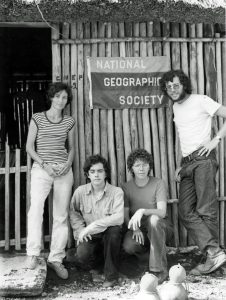
Laraine Fletcher (left) with fellow graduate students in Coba, Mexico
Spanish Provided a Way to Travel the World
That high school interest escalated in college. Dr. Fletcher majored in Spanish and took art history and anthropology classes as well. “Adelphi was a wonderful place, with small classes and you got to know your professors,” she said. “I have very good memories of my Spanish professor, Dr. Ruth Richardson, who used to bring the Spanish majors to her house for our final exam and give us tea and cookies.”
Using her second language to see the world, Dr. Fletcher spent her junior year abroad in Madrid, Spain, and immediately following college, was part of one of the original Peace Corps cohorts, teaching English in Colombia.
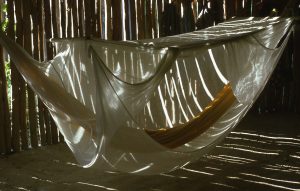
Dr. Fletcher’s hammock bed in Coba
Researching the Maya
Dr. Fletcher spent several years teaching high school Spanish in Manhattan, New York, before going to graduate school. She received her PhD in anthropology from Stony Brook University in 1978. “I really am an archaeologist, but all archaeologists are anthropologists,” she said. “Anthropology really is four fields: archaeology, cultural anthropology, linguistics and physical anthropology. I’ve taught them all.”
Dr. Fletcher first worked among the Maya when she was doing fieldwork in Mexico for her dissertation. “We lived in a small village,” she said. “Cancún hadn’t been built. So there were no roads, no electricity, just a little tiny Maya-speaking village.
“We were trying to understand what the Mayan cities looked like, how big they were, and the kinds of structures they had,” she said. “I had the luck to work with a great archaeologist, William Folan, at the large cities of Coba and Calakmul, where we initiated important mapping projects. The structures in the Yucatán are under a canopy of tropical rainforest. We had to go through the jungle with a machete and a Brunton compass and a tape. It was very arduous.”
The recent use of laser-imaging LIDAR has confirmed their groundbreaking research: What had been thought to be empty ceremonial centers were actually tremendously complex city-states with 30,000 or 40,000 people living in them.
After completing her doctorate, Dr. Fletcher returned to Adelphi, this time as a professor. She stayed for 32 years, continuing her research on the Maya in Nicaragua. Retiring in 2012 didn’t stop her from working, however.
The National Endowment for the Humanities Summer Institutes
Dr. Fletcher and George Scheper, PhD, an expert in cultural studies and religious studies, decided to offer National Endowment for the Humanities Summer Institutes seminars. These are competitive in-depth, on-site seminars where 26 faculty in a variety of fields from around the country spend up to six weeks in a deep dive on a topic, such as exploring the connections between the American Southwest and Mexico, and Native American cultures.
Fifteen seminars later, the final class was on Adelphi’s campus this summer, a fitting conclusion to 40 years of teaching. “The topic was a new look at the so-called conquest of Mexico,” Dr. Fletcher said. “We were looking very carefully at written documentation from Indigenous writers from the 1500s and 1600s, as well as maps and articles.”
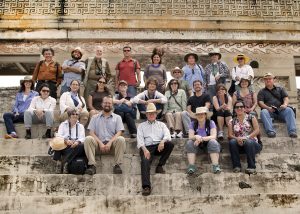
Faculty members from various institutions attending Dr. Fletcher’s National Endowment for the Humanities Summer Institute in Mitla, Mexico.
The Importance of Teaching About Indigenous Peoples
Over the course of her career, Dr. Fletcher taught a range of topics, including Mexico, Mesoamerican archaeology, cultural anthropology, and linguistic cultural communication. Her favorite was her course on economic development in what were then called third world countries. She never taught a course solely on the Maya, however.
“Universities do not do enough about explaining the prehistory of not just the Maya but the Indigenous peoples of the Americas, both in South America, Middle America and Central America, and, of course, the United States,” she said. “Most Americans are quite ignorant about the history, as well as the prehistory of both North and South America. There is much work to be done to remedy this.”
In fact, she said, millions of Mayans today are living in the same locations as their ancestors and speaking more than 32 surviving Mayan languages.
“They’ve survived horrible assaults on their lives and property, starting with the so-called conquest, through to genocide in modern-day Guatemala,” she said. “But they are recovering their history and their prehistory—and they’re proud of it.”